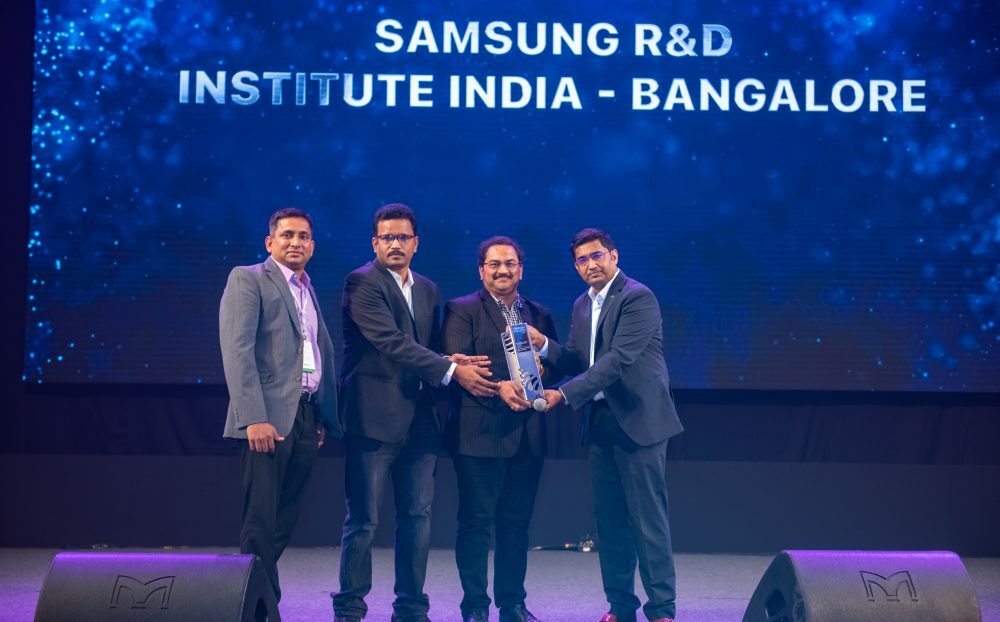Bangalore’s Samsung R&D Institute gets the national award for intellectual property.

The National Intellectual Property Award 2021 and 2022 in the category of top public limited firm/private limited company for patents filing, grant, and commercialization in India: Services Sector has been given to Samsung’s largest R&D facility outside of Korea.
SRI-B also took home the IP Enterprises Trophy from the World Intellectual Property Organization (WIPO).
Mr. Piyush Goyal, Union Minister of Commerce and Industry, Consumer Affairs, Food and Public Distribution and Textiles, Government of India, gave the award to SRI-B at a ceremony in New Delhi.
We at Samsung are honoured by the Government of India’s outstanding award. It is a testament to our efforts to raise the bar for innovation and patent standards as well as to instil a strong culture of patent filing inside our company in the fields of communication protocols, visual intelligent solutions, AI/ML, the internet of things, data intelligence, and services. According to Mohan Rao Goli, Chief Technology Officer, SRI-B, Samsung’s vision is to “inspire the world by developing game-changing breakthroughs, technologies, products, and designs that enrich people’s lives.
The Ministry of Commerce & Industry of the Government of India’s Department of Industrial Policy & Promotion (DIPP) annually bestows the National Intellectual Property Awards on exceptional organisations, businesses, and individuals in the fields of patents, designs, and trademarks.
The National Intellectual Property (IP) Awards are given out each year to honour and reward the top achievers in the fields of IP creation and commercialization, including people, institutions, businesses, and organisations. These achievements have a positive impact on the nation’s IP ecosystem by fostering innovation and creativity.
SRI-B has so far applied for approximately 7,500 patents both domestically and abroad. SRI-B engineers have applied for patents in relation to technologies such multi-camera systems, 5G, 6G, and ultra-wideband wireless communications protocol. Commercial applications of these patents include, among others, network equipment and Samsung’s flagship Galaxy smartphones and wearables.
By enhancing the calibre of its ideas and cultivating a patents mindset among its engineers, SRI-B has set out on a path to become a patent powerhouse in recent years. Many new, young inventors have arisen at SRI-B in recent years.
Nearly 50% of patent applicants at SRI-B today are first-time creators, and 27% have less than five years of experience. The number of yearly patent applications by SRI-B has climbed by 100% over the past four years, and the number of Samsung patents that have been commercialised has increased by four times over the past three years, implying that these advancements will eventually be included in Samsung goods. Most patent applications are in new fields like 5G, AI, ML, IoT, camera & vision technology.
To help staff members comprehend the concept and procedure of innovation, SRI-B offers a dedicated intellectual property team that leads advanced inventive step training and invention-creation training.
SRI-B has also established an internal site to streamline the procedure for the innovators. This website serves as an engineer’s one-stop shop for all the information needed to file a patent.
As part of the well-known student engagement programme Samsung PRISM, Samsung R&D has been working with young innovators from leading engineering institutions to deepen the connection between industry and academia.
Since Samsung PRISM’s launch in 2020, over 4,500 engineering students and 1,000 professors have collaborated with SRI-B engineers to successfully complete live projects. Along with SRI-B engineers, student and professor teams have applied for numerous patents during this time, and they have published numerous research papers in cutting-edge fields like artificial intelligence, machine learning, and the internet of things, supporting Samsung’s goal of empowering digital India.
By 2025, SRI-B plans to expand this programme to 70 engineering institutions in India in an effort to boost the nation’s innovation ecosystem and prepare students for the workforce.